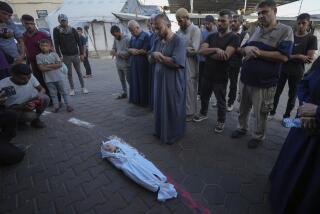East Coast Hospitals Gearing for Gulf Wounded : Medicine: For Vietnam casualties, it was the West Coast. Not this time. It could be the biggest such effort since World War II.
- Share via
WASHINGTON — With U.S. forces embarked on a ground war, the Pentagon says it is preparing large military and naval hospitals on the East Coast to become major hubs for receiving wounded from the Persian Gulf.
The facilities, which include the Bethesda Naval Medical Center outside Washington, Walter Reed Army Medical Center here and the Malcolm Grow Medical Center at Andrews Air Force Base, are poised to move into high gear.
Officials say that, depending on the ferocity of the ground fighting, it could prove to be the biggest such effort since World War II.
Unlike the Vietnam War, when most casualties were taken to military medical facilities on the West Coast, the burden this time is expected to fall largely on the East Coast hospitals.
“In peacetime, these hospitals are treading water,” says one naval reserve physician stationed at Bethesda, Md. “But in wartime, they go on the front lines, too.”
The war preparations have been extensive.
Leaves have been canceled and some personnel have been placed on 12-hour shifts. Additional supplies have been ordered, wards have been rearranged or expanded, and contingency plans are ready for doubling bed capacity.
“We know what we can do, and we’re ready,” said Capt. William Rowley, deputy commander of Bethesda.
The hospitals are holding seminars and courses to enhance their staffs’ training in certain techniques, such as burn management. Civilian experts and hospitals are being lined up to help deal with the unexpected.
Veterans hospitals, with their special knowledge of spinal cord injuries, will likely be called upon to receive many of these cases.
The military has alerted civilian hospitals belonging to the National Disaster Medical System--a network formed to be activated in times of disaster--to be ready to handle casualties in the event of an overflow, or to take patients who require special care.
The lobby of the naval hospital has been designated a triage area, where patients on litters will wait to be assigned to appropriate hospital stations.
Planning for even the remotest of possibilities, the garage at Walter Reed has been designated a chemical decontamination unit if terrorists hit the Washington area in a chemical attack.
One difficulty is that no one knows how many casualties to expect, or how bad they will be.
“We have well-trained people, good equipment and everything is in place, but you cannot predict the vicissitudes of war,” said Col. Russ Zajtchuk, deputy commander of Walter Reed.
The likelihood for mass casualties is great, military medical officials believe, because “this is a high-intensity war that does not involve light infantry, which was characteristic of Vietnam,” said Col. Ron Bellamy, acting chief of surgery at Walter Reed.
“I was in Vietnam,” said Zajtchuk, a thoracic surgeon. “This will be different. It’s different when you have somebody coming in hit with a high-velocity weapon. It makes a big hole.”
Zajtchuk said they expect that the most common wounds will include ballistic injuries, which are caused by bullets or grenades; blast injuries, which often carry a force so great that “they throw things, and cause internal injuries,” and massive burns.
The military was recently criticized by several civilian trauma experts for its plan to send critically injured soldiers to military facilities first, rather than to civilian trauma centers where, they said, the expertise is better.
Military medical officials insist that the key trauma work will occur in the field--where such efforts are critical in the minutes and hours after an injury--and most of the wounded will arrive here stabilized.
Further, they say, members of the armed services, if given the choice, would opt to be cared for in military installations.
“One of the reasons we don’t send men to civilian trauma centers is because it’s not what we’re used to--we take care of our own, like a family, and that’s what the soldiers want and expect,” Bellamy said.
The military has taken steps to beef up its trauma training in recent years, officials said. “We now have quite a few people who are trauma experts,” Rowley said.
Most military hospitals are now staffed largely by reservists, many of whom gained considerable trauma expertise in their civilian practices.
“The care is going to be comparable,” said Cmdr. Martin Eichelberger, a naval reservist stationed at Bethesda who, in civilian life, heads the trauma service at Children’s National Medical Center here.
More to Read
Sign up for Essential California
The most important California stories and recommendations in your inbox every morning.
You may occasionally receive promotional content from the Los Angeles Times.













